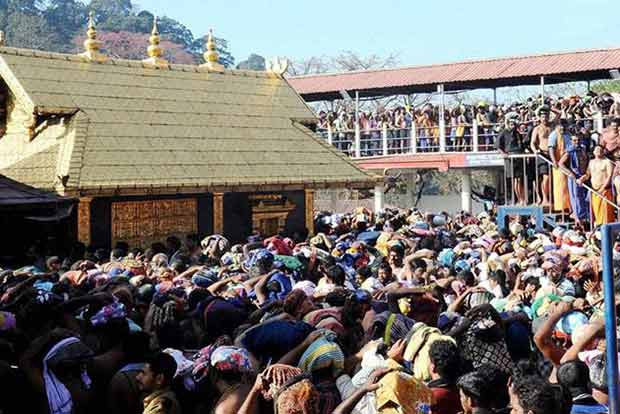Begin typing your search...
Sabarimala row: Judicial scrutiny of religious practices would open Pandora's box says Sabarimala temple board
The board running the Sabarimala temple in Kerala today told the Supreme Court that judicial scrutiny of old "uninterrupted" religious practices like the ban on entry of women of a particular age group into the famous shrine would open a "Pandora's box".

New Delhi
A five-judge Constitution bench headed by Chief Justice Dipak Misra was told by senior advocate A M Singhvi, appearing for the Travancore Devaswom Board, that test of constitutional morality cannot be applied to old religious practices.
"All mosques, except those of Dawoodi Bohra Muslim sect, do not allow women inside... It will open the pandora's box. There are several religions and several practices," Singhvi said, adding that there were "millions of faiths and beliefs" and they may not pass the constitutional morality test.
"My belief may be fickle, irrational. There are sects of Shias who believe in self-flagellation. Many will call it barbaric, others will say it is religious. It is certainly not in consonance with 2018 notions, but it is still my belief," he submitted before the bench which also comprised Justices RF Nariman, AM Khanwilkar, DY Chandrachud and Indu Malhotra.
The senior lawyer was responding to the observation of the bench that a person can be restrained from entering a religious place only on the grounds of "public health, public order and morality" under the Constitution and the ban of women will have to clear the test of "constitutional morality".
He said the practice be not seen through the prism of modern ethos and any revulsion at a practice was immaterial.
The temple board said that the veracity of the religious has to be tested in trial and the apex court cannot do it without analysing the evidence.
"If not, then it would disturb a part of Hindu faith," he said.
He also gave a list of temples and religious places of other faiths where entry was selectively granted and said that these matters pertained to religion which cannot be tested only on the grounds of the Constitution.
The court reacted sharply to the submission of the senior lawyer that women, on their own, do not visit temple during the days of menstruation.
"In a patriarchal society, women are made to go through a certain social conditioning from birth. How to behave, what to say, what to do," the bench said.
It also said men, due to their "overwhelming dominant position" framed such norms that women cannot maintain purity for 41 days.
"You say men go to the Sabarimala temple because their dominant status makes them capable for austerity. But a woman, a chattel of man, cannot practice austerity. How can we accept this," the bench asked.
Women before puberty and after menopause are allowed into the Sabarimala and men regardless of the puberty or andropause can enter, the bench observed.
Visit news.dtnext.in to explore our interactive epaper!
Download the DT Next app for more exciting features!
Click here for iOS
Click here for Android
Next Story



